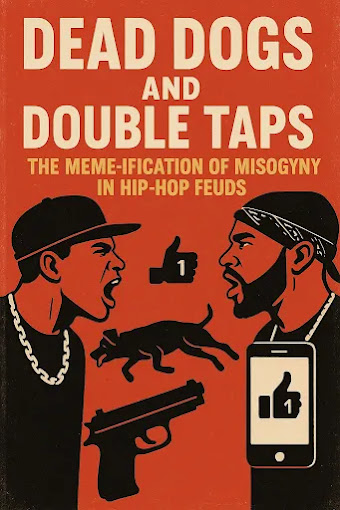A media literacy article on how outrageous moments go viral, even when they cross moral lines.
It started with a tweet. Then came the retweets, the Instagram stories, the fan-cam mashups set to sped-up Doja Cat tracks, and the inevitable wave of TikTok stitches. Before the dust could even settle, Nicki Minaj’s inflammatory jab at SZA—saying she sounded “like a f**king dead dog”—had evolved into a meme. But beneath the viral humor, the remix culture, and the digital frenzy lies something darker: a culture where misogyny cloaked in pop culture pettiness gets liked, shared, and celebrated.
In hip-hop, feuds are nothing new. They've always been part of the ecosystem, sometimes elevating lyrical battles to the level of sport. But there’s a difference between dissing someone’s bars and likening a Black female artist’s voice to roadkill. When women become the target—and when that targeting becomes entertainment—we cross into a realm that demands scrutiny. The digital space doesn't just reflect culture anymore. It mutates it, distorts it, and monetizes even its ugliest impulses. That’s what we’re witnessing now.
Nicki Minaj’s choice of insult wasn’t just harsh; it was viscerally dehumanizing. The phrase “dead dog” isn’t simply a description—it’s an image, a smell, a rotting metaphor intended to evoke disgust. It’s a rejection of value, of vitality, of art. It’s cruel. And yet, within hours, it was a punchline. Users were lip-syncing the line on TikTok, inserting barking sound effects, overlaying funeral dirges onto SZA performance clips. It was viral gold—and that’s precisely the problem.
Because when cruelty is catchy, misogyny becomes marketable.
This is the meme-ification of harm: the transformation of emotionally violent speech into digital currency. A shocking phrase becomes a trending sound. A petty insult becomes a punchline. And the more outrageous the attack, the better it performs in the algorithm. Likes, shares, and double taps become social proof—not of artistic genius or critical discourse, but of who won the internet for the day.
What’s worse, women—especially Black women—are often left to bear the brunt of this cultural economy. In rap, when two men feud, their blows are parsed as lyrical strategy. When women feud, it’s catty. It’s emotional. It’s “bitch behavior.” And when one woman degrades another, it’s somehow easier for the internet to indulge. Why? Because it's internalized. Because we’ve come to expect this, and in some ways, to enjoy it.
This is a twisted kind of digital theater. Audiences aren’t just watching these spats unfold; they’re participating. Fans pick sides like it’s a reality show. They post memes, remix quotes, and weaponize old interviews as ammunition. This isn’t commentary—it’s content creation. And in the rush to be clever, we often forget the real people behind the screen names.
SZA, for her part, remained largely silent in the immediate aftermath, letting the noise crescendo without interruption. That silence said more than any clapback ever could. It was dignified. But also damning. Because in a culture that rewards volume and venom, silence gets ignored. Or worse—it gets mocked.
Meanwhile, Nicki Minaj, a legend in her own right, continues to embody one of the most complex paradoxes in modern music: a woman who has broken barriers for female rappers while sometimes tearing down the very women who followed her through those doors. Her career has long walked the line between icon and instigator. And that line keeps getting blurrier.
So, what does all this say about us?
It says that we’re complicit. That we’ve grown too comfortable with watching women battle in public as if it’s gladiator sport. That we excuse harmful language if it comes wrapped in glittering celebrity. That we double tap dehumanization if it makes us laugh for half a second.
And this isn't just about Nicki or SZA. It's about what we amplify. What we normalize. What we reward.
Misogyny in hip-hop—and in our broader culture—doesn’t always show up in obvious ways. Sometimes it arrives wrapped in memes, carried by viral sounds, disguised as shade or "just jokes." But whether it’s overt or dressed up in internet irony, it still does damage.
The solution isn’t censorship. It’s consciousness. It’s asking ourselves why we laugh. Why we share. Why we let cruelty become content. It’s choosing to engage with culture more critically, more compassionately.
Because if we don’t check ourselves, we’re going to keep making memes out of moments that should make us uncomfortable. And sooner or later, we won’t just be laughing at someone—we’ll be laughing at ourselves.
And that, unlike a feud, won’t be so easy to walk away from.




No comments:
Post a Comment